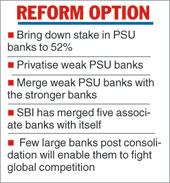
New Delhi: The government will consider the privatisation of extremely weak PSU banks along with their consolidation with stronger PSU banks.
Top finance ministry officials said disinvestment and even privatisation cannot be ruled out as part of bank reforms.
"Disinvestment in PSU banks can take state-held equity close to 52 per cent in strong banks. While weak banks if they do not improve their performance post recapitalisation could be sold off," said the officials.
IDBI Bank, with the ratio of bad assets to total assets of over 24 per cent, may be a candidate for privatisation.
The bank had been set up under the companies act, meaning privatisation will not require Parliamentary approval.
"We will be recapitalising banks in a selective manner. More funds will be made available to stronger banks, while those banks which have performed badly and are under watch will only get partial recapitalisation needed to meet safe banking norm requirements," the officials said.
Some seven banks - UCO, UBI, Indian Overseas Bank, Central Bank, Dena, Bank of Maharashtra and Corporation Bank - are considered "weak" as their NPA levels are above 15 per cent and they have limited strength to revive themselves.
India had nationalised banks in 1969 after a string of bank failures, many of which were engineered that left their owners richer, and a marked propensity to lend to industry owned by bank owners or their relatives. Between 1947 and 1955, some 361 banks "'failed", at the rate of 40-plus a year.
Officials said the government was also considering merging smaller banks with the larger ones such as Punjab National Bank, Bank of Baroda and Canara Bank.
Officials said a preliminary round of talks have been held with banks to prod them towards creating larger entities through mergers.
"The idea is a larger regional bank takes on a smaller bank from another region to take on a pan-Indian footprint. The smaller bank of course has to be a good fit in terms of managerial systems and work ethics," said the officials.
The other alternative could be regional consolidations so that a north-based bank takes over another but a smaller north-based entity.
Chief economic adviser Arvind Subramanian had earlier this week made a case for consolidation "We need about 5 - 7 reasonably big banks both public and private sector and to be able to compete domestically and to be competitive intentionally." The cabinet has already given in-principle approval to the mergers of PSU banks.
Earlier this year, the State Bank of India merged its five associate banks to create a behemoth. The boards of SBI's five associate banks - State Bank of Bikaner and Jaipur, State Bank of Travancore, State Bank of Patiala, State Bank of Mysore and State Bank of Hyderabad - had passed resolutions seeking the merger last year.
North Block had long planned moves towards the consolidation of state-run banks into mega corporations to stand up to their global rivals which will eventually have to be allowed to enter India as part of either a WTO deal on services or bilateral or regional free trade pacts.
"We will be going forward with a wave of consolidation but this has to be politically acceptable. Talks are needed for this and we will be discussing with banks," top finance ministry officials said.










